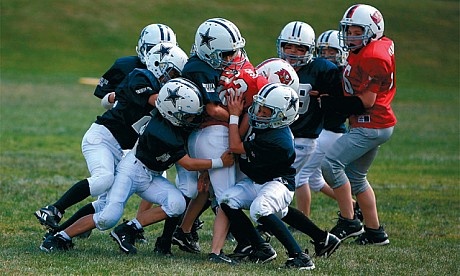Every pro sports league does them. Those public service announcements and commercials with athletes reading to kids or teaching them sports skills. While my point is not to dismiss the genuine good many of these efforts bring to our communities, here’s a community “service” project for the NFL that will have more positive impact on the health and educational well being of our nation than all of the NFL’s other public service projects combined.
Specifically, the NFL should assume responsibility for the administration, conduct and costs related to the development of football players.
It is notable that the United States is the only country in the world in which the responsibility for developing elite athletes and teams rests with the educational system. In Europe that responsibility rests with private sports clubs, professional teams and national sports governing bodies. The responsibility of the educational system regarding athletics is to promote and encourage broad based participation in activities that can be enjoyed for a lifetime for purposes of public health.
In some sports, such a shift is well on its way. Many athletes in the sports of soccer, basketball and swimming have come to consider their participation on local club, AAU or all-star teams more important than participation on their high school teams.
So why not football?
Why should our already financially strapped junior high and high schools be responsible for sponsoring and financing an activity that mangles bodies, scrambles brains, has diminishing educational value due to an increasing emphasis on winning and develops skills in participants that have little to do with future success in the creative and innovative economy and world community of the future?
Make no mistake, the costs of our heavy educational “investment” in football are steep. Yes, football’s entertainment qualities can bring joy, unite a community and teach valuable life lessons, but the fact is, football is not unique in its’ potential to provide these benefits. Other sports and activities, such as music, can provide such advantages and more, without those side effects.
Fortunately, there is an organization that exists that could assume responsibility for operating a national club football system, USA Football. USA Football is the national governing body for football, working locally with hundreds of youth football organizations on safety issues and coaching certification. Granted, it would take significant time, effort and expense to get USA Football to a place where it could take on this challenge. But the good news is that USA Football is part of an organization with unparalleled visibility, significant financial clout and sufficient administrative and organizational reach, structure and resources – The National Football League.
Is such a notion and shift far-fetched? No. The NFL has the deep pockets, administrative expertise, cultural influence and societal clout to make it work.
Frankly, it’s about time the NFL made this investment. They have benefitted from a model that any business would kill for. They invest nothing in “product” (player) development. That is a service our educational system and our tax dollars provide for them at no cost.
Contrary to what sports fans might believe, our nation’s educational system would not collapse if the responsibility for developing football players was “privatized”. Players and coaches would continue to hone their skills as training activities would simply shift to USA Football. Further, there is nothing to suggest that football must be a part of an educational institution for young people to learn the lessons of discipline, sportsmanship, teamwork, and sacrifice. The potential to utilize football as a means to build character and teach these lessons will remain, regardless of the team’s sponsoring agency.
After an initial public outcry, fans would come to identify with the team of their choice, despite it being run by USA Football rather than the local high school. While our schools may less fun without football, they will continue to go about the business of educating. In fact, the education of students would likely improve as the focus on academics would intensify.
Again, the point of this essay is not to diminish the great work and public service the NFL is doing in our communities. But relieving our schools of the responsibility for underwriting and administering the NFL’s player development system? That is a public service that will have an enormous, long-term positive societal impact on not only the 114 million people who watched the 2015 Super Bowl, but also for the almost 200 million people who did not.

